
As the 2025 deadline approaches, the importance of understanding Energy Performance Certificate requirements becomes increasingly critical. Both residential and commercial property owners must navigate new regulations that mandate a minimum rating of E. Compliance not only affects marketability but also reflects broader sustainability goals. What specific steps should property owners take to guarantee adherence? Exploring the intricacies of these requirements reveals much about future obligations and potential impacts on property values.
Key Takeaways
- By 2025, residential properties must achieve a minimum EPC rating of E before being marketed for sale or rent.
- Commercial properties also require a minimum EPC rating of E to comply with upcoming sustainability regulations.
- Property owners are encouraged to conduct energy assessments before listing to identify improvements needed for compliance.
- EPCs are valid for ten years, but updates are necessary after significant renovations or ownership changes.
- Non-compliance with EPC requirements can result in fines and hinder property transactions in the market.
What Is an Energy Performance Certificate (EPC)?
An Energy Performance Certificate (EPC) serves as an essential indicator of a property’s energy efficiency. It provides a thorough assessment of how well a building utilizes energy, with ratings typically ranging from A to G, where A represents the highest efficiency and G the lowest.
The EPC includes important information about the property’s energy consumption, carbon dioxide emissions, and recommendations for improvement. This certificate is generated following a standardized evaluation conducted by a qualified assessor, who inspects various aspects of the building, including heating systems, insulation, and ventilation.
EPCs are significant for homeowners, potential buyers, and tenants, as they offer insights into energy costs and environmental impact. In many regions, obtaining an EPC is a legal requirement when selling or renting a property.
The certificate not only helps in making informed decisions but also encourages the adoption of energy-saving measures, ultimately contributing to a more sustainable future.
Why Understanding Energy Performance Certificate Requirements Matters
Understanding the requirements surrounding Energy Performance Certificates (EPCs) is essential for property owners and prospective buyers alike, as it directly impacts their financial and environmental decisions.
Knowledge of EPC standards can influence property value, energy efficiency, and compliance with regulations.
- Financial Implications: Higher energy efficiency ratings can lead to lower utility bills.
- Marketability: Properties with favorable EPC ratings are often more attractive to buyers.
- Environmental Responsibility: Understanding EPCs supports sustainable living and reduces carbon footprints.
- Legal Compliance: Familiarity with EPC requirements helps avoid potential legal penalties.
- Future-Proofing: Adhering to evolving EPC standards prepares property owners for upcoming regulations.
Who Needs an EPC and When Is It Legally Required?
Property owners and landlords must obtain an Energy Performance Certificate (EPC) when they sell or rent out a property, as this document assesses the energy efficiency of a building. The requirement applies to residential and commercial properties, ensuring that prospective tenants or buyers are informed about energy consumption and potential costs.
An EPC is legally required before any marketing of the property occurs, whether through advertisements or viewings. Additionally, landlords must have a valid EPC in place to comply with regulations, particularly when entering tenancy agreements.
Failure to provide an EPC can result in fines or legal repercussions. It’s also important to note that existing properties are subject to EPC requirements during the sale or leasing process, and new builds must have an EPC before completion.

Step-by-Step Breakdown of Energy Performance Certificate Requirements
Obtaining an Energy Performance Certificate (EPC) involves a series of clear steps that property owners and landlords must follow to guarantee compliance with legal requirements.
Understanding this process is essential for confirming that properties meet energy efficiency standards.
- Assess Property Type: Determine if the property requires an EPC based on its usage and size.
- Hire a Qualified Assessor: Engage a certified energy assessor to conduct a thorough evaluation.
- Conduct Energy Assessment: The assessor will inspect the property, reviewing insulation, heating systems, and energy use.
- Receive EPC: After the assessment, the EPC will be issued, detailing the property’s energy performance rating.
- Implement Recommendations: Address any suggested improvements to enhance energy efficiency and guarantee compliance by 2025.
Following these steps helps property owners navigate the EPC process effectively, providing clarity on their obligations and confirming compliance with upcoming regulations.
EPC Ratings and What They Mean for Your Property
EPC ratings serve as a significant indicator of a property’s energy efficiency, reflecting its environmental impact and potential energy costs. These ratings range from A to G, with A denoting the highest efficiency and G the lowest. A higher EPC rating typically signifies lower energy bills and a reduced carbon footprint, making properties more attractive to environmentally conscious buyers and renters.
Properties with higher ratings may also benefit from government incentives and increased market value, while those rated D or below will face challenges as regulations tighten.
Understanding EPC ratings is fundamental for homeowners and landlords, as these scores influence decisions related to energy improvements and compliance with future regulations.
How to Meet Energy Performance Certificate Requirements as a Landlord
Meeting Energy Performance Certificate requirements is essential for landlords aiming to maintain compliance and attract tenants.
To achieve a satisfactory rating, landlords should undertake several key actions that enhance their property’s energy efficiency.
- Conduct an energy audit to identify areas for improvement.
- Upgrade insulation in walls, roofs, and floors to minimize heat loss.
- Install energy-efficient heating systems, such as condensing boilers or heat pumps.
- Replace old windows with double or triple glazing to improve thermal performance.
- Utilize renewable energy sources, such as solar panels, to reduce reliance on traditional energy.
Common Mistakes Property Owners Make with EPC Requirements
Although many property owners endeavor to comply with Energy Performance Certificate requirements, they often fall short due to common pitfalls. A frequent mistake is overlooking the significance of energy efficiency improvements prior to obtaining an EPC. Property owners may assume that simply obtaining the certificate suffices, neglecting necessary upgrades that could enhance their property’s rating.
Another common error is misunderstanding the validity period of the EPC. Many property owners mistakenly believe that once the certificate is acquired, it remains valid indefinitely, leading to potential non-compliance when it expires.
Additionally, failing to engage qualified assessors can result in inaccurate ratings, which may impact future sales or rentals.
Ultimately, some property owners ignore ongoing maintenance practices that can affect energy performance, assuming that initial ratings guarantee long-term efficiency. Awareness of these pitfalls can help property owners navigate EPC requirements more effectively and avoid costly consequences.
How Long Do Energy Performance Certificate Requirements Apply?
Understanding the duration of Energy Performance Certificate requirements is essential for property owners aiming to maintain compliance. The regulations surrounding EPCs dictate specific timeframes within which these certificates must be obtained and renewed. Generally, an EPC is valid for ten years, but several factors can influence this timeline.
- EPCs must be updated upon significant renovations.
- Changes in ownership may require a new EPC.
- Properties that undergo major energy efficiency improvements need re-evaluation.
- EPCs should align with local regulations and upcoming legislative changes.
- Landlords must guarantee EPCs are renewed before they expire to avoid penalties.
Awareness of these factors helps property owners navigate the complexities of EPC requirements effectively.
How Energy Performance Certificate Requirements Affect Rental Properties
As energy efficiency becomes increasingly prioritized in the rental market, Energy Performance Certificate requirements greatly influence landlords and tenants alike.
Landlords must guarantee their properties meet minimum energy efficiency standards, which can impact rental prices and marketability. Properties with better EPC ratings are more attractive to prospective tenants, who often seek energy-efficient homes to reduce utility costs. Consequently, landlords may need to invest in upgrades, such as improved insulation or energy-efficient appliances, to comply with regulations and maintain competitiveness.
For tenants, EPC ratings provide essential information about a property’s energy usage, allowing informed decisions. A higher EPC rating generally signifies lower energy bills and a smaller carbon footprint, aligning with many tenants’ environmental values.
Energy Performance Certificate Requirements for Commercial Properties
While the energy efficiency landscape evolves, Energy Performance Certificate requirements for commercial properties are becoming increasingly stringent.
These changes aim to enhance sustainability and reduce carbon footprints in the corporate sector. By 2025, property owners will need to comply with specific standards to maintain the marketability of their buildings.
- Minimum Energy Efficiency Standards (MEES): Properties must achieve a minimum EPC rating of E.
- Regular Assessments: Frequent EPC assessments will be mandatory to guarantee compliance with updated regulations.
- Investment Incentives: Financial support may be available for upgrades aimed at improving energy efficiency.
- Disclosure Obligations: Owners must share EPC ratings with potential tenants and buyers.
- Long-term Sustainability Goals: Aligning with national and international climate targets will be vital for all commercial properties.
Understanding these requirements is essential for property owners looking to stay competitive and compliant in the evolving market.

Energy Performance Certificate Requirements for Homeowners Looking to Sell
Homeowners looking to sell must be aware of the evolving Energy Performance Certificate requirements that will take effect by 2025.
As part of a broader effort to enhance energy efficiency in residential properties, these requirements will mandate that homes achieve a minimum EPC rating before they can be marketed for sale. Currently, the minimum acceptable rating is set at E, but future regulations may raise this standard, potentially to C or higher.
To comply, homeowners should consider conducting an energy assessment before listing their property.
This proactive step allows them to address any necessary improvements, such as insulation upgrades or efficient heating systems, thereby increasing their home’s value and appeal to prospective buyers.
Additionally, obtaining an updated EPC can demonstrate a commitment to sustainability, which is increasingly important to today’s environmentally conscious buyers.
Understanding these requirements is essential for a successful and compliant sale.
Who Must Comply with Energy Performance Certificate Requirements?
Who is required to comply with Energy Performance Certificate requirements?
EPC compliance is vital for various property owners and landlords in order to promote energy efficiency. The following groups are obligated to adhere to these regulations:
- Homeowners selling properties: Must provide an EPC to potential buyers.
- Landlords: Required to have an EPC for rental properties, guaranteeing tenants are informed about energy performance.
- Commercial property owners: Must obtain an EPC when leasing or selling commercial spaces.
- New construction developers: Required to secure an EPC for new buildings before they are occupied.
- Property management companies: Must make sure that all managed properties meet EPC standards for compliance.
Understanding energy performance certificate requirements and their implications is significant for maintaining legal obligations and fostering energy-efficient practices within the property market.
Failure to comply can result in penalties and hinder property transactions.
Frequently Asked Questions
Yes, individuals can appeal their energy performance certificate rating. This process typically involves submitting evidence to support the claim that the rating is inaccurate, often requiring additional documentation or expert assessments to substantiate the appeal.
Energy performance certificates must be updated whenever significant changes occur in a property, such as renovations or alterations affecting energy efficiency. Typically, they should be reviewed every ten years to guarantee compliance with current standards.
Yes, there are exemptions to EPC requirements. Properties that meet specific criteria, such as listed buildings or those undergoing major renovations, may not need to comply with standard energy performance regulations, depending on local legislation.
Penalties for non-compliance with EPC regulations can include fines, legal action, and restrictions on property sales or rentals. These measures aim to enforce energy efficiency standards and encourage adherence to environmental regulations within the housing sector.
An Energy Performance Certificate from another country is generally not valid in the UK. Each country has its own regulations and standards, necessitating a UK-specific EPC to meet local compliance and energy efficiency requirements.
Conclusion
To summarize, the upcoming 2025 Energy Performance Certificate requirements signify a pivotal shift towards enhanced energy efficiency in both residential and commercial properties. By understanding the obligations surrounding EPCs, property owners can proactively improve their energy ratings, ensuring compliance and promoting sustainability. As the deadline approaches, taking timely action to meet these standards will not only benefit the environment but also enhance property value and marketability in an increasingly eco-conscious landscape.
About the Author: Atia Amin
Related Posts
Get Social
Recent Posts
- The Role of Fire Alarm Installation in Building Safety
- How Often Should a Fire Risk Assessment Be Reviewed?
- What must landlords get right for Fire Risk Assessment London compliance?
- UK Gas Safety Regulations for Landlords & Tenants: Introduction to Gas Safety Certificates
- Check If Your Gas Engineer is Registered: London Gas Safety Certificate London













